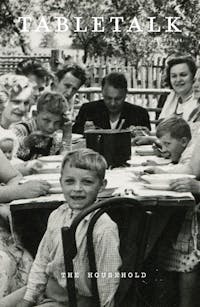
Request your free, three-month trial to Tabletalk magazine. You’ll receive the print issue monthly and gain immediate digital access to decades of archives. This trial is risk-free. No credit card required.
Try Tabletalk NowAlready receive Tabletalk magazine every month?
Verify your email address to gain unlimited access.
Let’s skip past lamenting the condition of the culture. I doubt readers need convincing. In reality, the Bible has never stopped cutting across the grain of a fallen world. In every age the church must re-root itself in the Scriptures to understand and apply the truth and continually ask, “What does God require of me?” For married men, that task is simple.
Interestingly, the Bible has surprisingly little to say about what husbands and fathers are supposed to be and do in a household. Yes, there’s a great deal we learn from both Old and New Testaments about God’s design for the family (Gen. 1–3), the blessing of family (Ps. 128), wise or better practices in families (Proverbs) and approved examples (Abraham, Job, Boaz). But many roles are taken for granted as ordinary: disciplining (Heb. 12:7–10), saving up (2 Cor. 12:14), providing food (Matt. 7:9–11), or encouraging (1 Thess. 2:11–12). These verses simply report what any decent father, converted or not, would do.
There are only a few clear imperatives in the Bible when it comes to men in the Christian household. In the Old Testament, Deuteronomy 6 and a few similar texts and the aphorisms of Proverbs speak to the father’s duty to teach and train in the law and wisdom of God. The New Testament limits itself to Ephesians 5:25–6:4 (see als0 Col. 3:19–21) along with 1 Peter 3:7 and 1 Corinthians 7 by way of direct commands. What does that tell us? In one sense this is very good news: a man has a great deal of freedom and simplicity regarding who he is to be toward his family.
With respect to his wife, a husband is to love. If love is a mere abstraction, we should repent and work to love our wives sincerely. When Paul in Ephesians 5:25 commands husbands to love their wives, it only takes three more words before he has husbands considering Christ and the church. And in the same sentence, Paul points to the very clear illustration and tangible accomplishment of Jesus’ love: “He gave himself up for her.” You can’t be a believer without knowing what that means. At an actual time, in an actual place, according to a definite plan, the Son of God fulfilled a commitment on His part and performed an act for the church’s benefit that no one else could be expected to do. Could a husband learn from that? Absolutely. Loving your wife is continually and practically rehearsing the model of Christ’s love actions. It means knowing her (1 Peter 3:7) and what she needs and expending yourself for her benefit with more than intentions but rather with overt actions that are costly to you, whether it’s opening the Word for her or being open to her words, encouraging the use of her spiritual gifts, or ensuring she can buy gifts, guarding against bad theology or making sure the doors are locked at night. Her burdens are your burdens. And so, you prize her and beautify her with your very busy love. Self-forgetfulness is essential.

With respect to children, Paul’s instructions make your home-work equally simple. Train up your children with both teaching and discipline (Eph. 6:4). Again, this is simple but not easy. Paul, with his Old Testament backdrop, expects both knowledge of the Word of God (Deut. 4:9; 6:7) and means of discipline (e.g., Proverbs). But that you teach and discipline according to a godly standard is not negotiable. It is fundamental to being a father versus being a sire. And pay attention to Paul’s highly instructive qualifying command: Don’t provoke or exasperate them (Eph. 6:4; Col. 3:21). We don’t pat ourselves on the back and say to ourselves, “Well done, good and faithful me,” just because we’ve read the Bible out loud, commanded, and disciplined. Technique matters. How a child responds to our discipline and instruction matters. We may need to understand our children better in the same way we need to understand our wives (1 Peter 3:7). Surely, our Savior knows His bride, and your Father in heaven knows His children.
Again, the Bible gives no indications that being a godly husband or father is easy. But it is simple. Love and live together with understanding. Teach and discipline without provoking. When the Bible tells us what we’re supposed to be in the family, it is unambiguous. And where it speaks, it speaks theologically, and it speaks practically.
